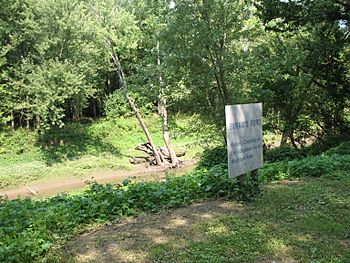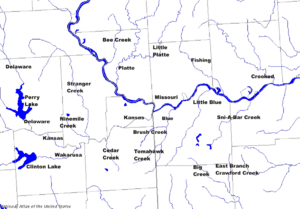Blue River (Missouri River tributary) facts for kids
Quick facts for kids Blue River |
|
|---|---|

Blue River at Byram's Ford where the Battle of Byram's Ford (a skirmish of the Battle of Westport) was fought by Swope Park
|
|

Blue River in the Kansas City metropolitan area
|
|
| Other name(s) | Big Blue River |
| Country | United States |
| State | Kansas, Missouri |
| City | Kansas City |
| Physical characteristics | |
| Main source | East Johnson County, Kansas, United States 725 ft (221 m) 38°48′31″N 094°40′50″W / 38.80861°N 94.68056°W |
| River mouth | Missouri River Kansas City, Missouri, United States 221 ft (67 m) 39°07′48″N 094°28′15″W / 39.13000°N 94.47083°W |
| Length | 39 mi (63 km), Northeast |
| Basin features | |
| River system | Missouri River |
| Tributaries |
|
The Blue River is a stream that flows for about 39.8 miles (64 km). It runs through Johnson County, Kansas, and Jackson County, Missouri. This area is part of the larger Kansas City area. The river starts in Johnson County, near the border of Kansas and Missouri. It then flows through Kansas City, Missouri, and finally joins the Missouri River. This meeting point is close to the border between Kansas City and Independence, Missouri.
The Blue River has several smaller streams that flow into it. These are called tributaries. Its main tributaries include Brush Creek, Tomahawk Creek, and Indian Creek.
Contents
Discovering the Blue River
The Blue River offers many fun things to do outdoors. You can find miles of trails along its banks. These trails are great for hiking, biking, and walking.
Trails and Old Railroads
Some parts of these trails follow an old steam railroad track. This track used to belong to the Missouri Pacific Railroad. It ran from Dodson, Missouri, south to Martin City, Missouri. The old rail line followed the Blue River closely. It had many curves because of the river's path.
In 1954, the railroad line was made straighter. Workers built three tall bridges over the Blue River. They also made a big cut through the land. This improved line is now used by the Union Pacific and KC Southern railroads. It generally runs next to the Blue River.
History of the Blue River
The Blue River has a rich history. It has been important to people for a very long time.
Ancient Mounds and Early Settlers
High above where the Blue River meets the Missouri River, there is a large Native American mound. This special place is known as Indian Mound Park. It is located in the Indian Mound neighborhood of Kansas City, Missouri. These mounds show that Native Americans lived here many years ago.
Later, three famous western trails crossed the Blue River. These were the Santa Fe, Oregon, and California trails. They crossed the river just north of Red Bridge Road and Minor Park. A well-known mountain man and fur trapper named Jim Bridger had a trading post at this spot. This was a place where travelers could trade goods.
The Blue River in the Civil War
During the American Civil War, the Blue River was a battleground. The Battle of Byram's Ford took place here. This battle was part of the larger Battle of Westport. It was an important event in the history of the region.
 | Madam C. J. Walker |
 | Janet Emerson Bashen |
 | Annie Turnbo Malone |
 | Maggie L. Walker |

